Timeline of the James Webb Space Telescope
This article needs to be updated. (July 2022) |
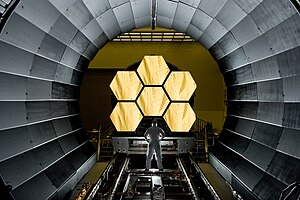
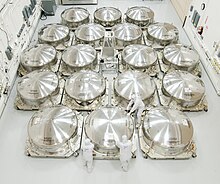
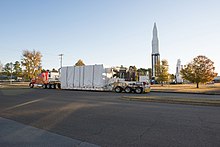
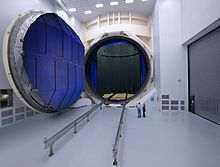
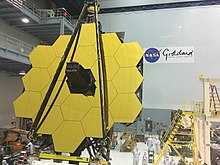
The James Webb Space Telescope (JWST) is an international 21st-century space observatory that was launched on 25 December 2021.[1][2] It is intended to be the premier observatory of the 2020s, combining the largest mirror yet on a near-infrared space telescope with a suite of technologically advanced instruments from around the world.[3]
The telescope is designed to last at least five and a half years (six months calibration plus five years science operations), but with a goal of ten years.[4] The limiting factor is expected to be fuel to maintain its halo orbit, of which there is enough for at least ten years.[4]
It was announced in December 2021 that due to the accuracy of the orbital insertion and course correction burns, the telescope had more fuel available than originally planned and could operate for "significantly" longer than the original ten year planned life span.[5]
JWST cost approximately $10 billion in its design, construction, and five years of operations (does not include extended mission funding), as well as international contributions.[6][7]
Timeline of selected events
[edit]- 1996: Next Generation Space Telescope initiated.[8]
- 2000: NEXUS cancelled (JWST technology demo).[9][10]
- September 2002: NGST named James Webb Space Telescope.[8][3]
- 11 September 2003: $824.8 million prime contract for JWST awarded to TRW.[11]
- January 2007: 9/10 technology development items pass non-advocate review.[12]
- April 2010: technical part of Mission Critical Design Review (MCDR) passes.[13]
- July 2011: James Webb project threatened with cancellation.[14][15][16][17]
- November 2011: JWST survives cancellation attempt.[18]
- 2012: MIRI instrument hand-off.[19]
- March 2013: FGS/NIRISS installed in the Integrated Science Instrument Module (ISIM).[20]
- 4 July 2013: MIRI installed in ISIM.[21]
- March 2014: NIRCam installed in ISIM[22]
- 24–25 March 2014: NIRSpec integrated into ISIM.[23]
- June 2014: first combined test of all four instruments including cryogenic testing in the Goddard Space Environment Simulator.[24]
- 2014: peak U.S. funding hit $650 million this year.[6]
- December 2015: contract for JWST's launcher signed with a launch date of October 2018.[25]
- February 2016: hexagonal segments of the primary mirror assembled.[26]
- March 2016: cryogenic testing of instruments and mirrors completed.[27]
- 3 March 2016: secondary mirror installed on Optical Telescope Element (OTE).[28]
- March 2016: Aft Optics Subsystem installed on OTE.[29]
- November 2016: JWST construction completed, with additional testing to come.[30]
- January 2017: JWST is fine after experiencing an anomaly during vibration testing in Dec 2016.[31]
- 27 March 2018: JWST launch delayed to at least May 2020 as issues arise, including ones with the propulsion system and potential snagging of the sunshield.[32]
- 27 June 2018: JWST launch postponed to 30 March 2021 based on recommendations by an Independent Review Board.[33]
- 16 July 2020: JWST launch postponed to 31 October 2021 due to the impacts of the COVID-19 pandemic as well as technical challenges.[34]
- 1 June 2021: JWST launch postponed to no earlier than November 2021 due to concerns regarding the readiness of the Ariane 5 launch vehicle and launch site.[35]
- 8 September 2021: JWST launch postponed to 18 December 2021.[36]
- 22 November 2021: JWST launch delayed to no earlier than 22 December 2021, to allow additional testing after experiencing vibrations due to an unplanned clamp release.[37]
- 15 December 2021: JWST launch delayed to no earlier than 24 December 2021, due to an electrical fault, resulting in a communications error between the observatory and the Launch Vehicle.[38]
- 21 December 2021: JWST launch delayed to no earlier than 12:20 UTC on 25 December 2021, due to adverse weather conditions at the launch site.[39]
- 25 December 2021: liftoff at 12:20 UTC.[40]
- 24 January 2022: JWST arrives at final orbit around the second Sun-Earth Lagrange point, or L2, nearly 1 million miles (1.51 million kilometers) away from the Earth.
- 11 July 2022: JWST has completed its commissioning activities and is ready to begin full scientific operations.
- 12 July 2022: JWST's first full-color images and spectroscopic data were released during a televised broadcast at 10:30 a.m. EDT (14:30 UTC) on Tuesday, July 12, 2022, from NASA's Goddard Space Flight Center in Greenbelt, Maryland.
Pre-launch plans
[edit]- 2016: OTE tests complete.
- 2017: OTIS tests complete.
- 2017: Spacecraft (including sunshield) tests complete.
- 2018: Observatory I&T complete.
- October 2018: planned launch date as of 2016.[3]
- Early 2019: planned launch date as of October 2017.[41]
- May 2020 or later: planned launch date as of March 2018.[42]
- 30 March 2021: planned launch date as of June 2018.[33]
- 31 October 2021: planned launch date as of July 2020.[34]
- November 2021 or later: planned launch date as of June 2021.[35]
- 22 December 2021: planned launch date as of November 2021.[36]
- 24 December 2021: planned launch date after delay due to communication issues between the observatory and the Launch Vehicle.[43]
- 25 December 2021: final launch date after delay due to forecasts of unfavorable weather during the launch window on 24 December.[2]
After-launch
[edit]- After launch, the James Webb Space Telescope was unfolded in the following planned order.[44]
- spacecraft appendages (solar arrays, high gain antenna)
- sunshield
- extend tower
- secondary mirror
- primary mirror
- For 29 days after launch, JWST took a 1.51 million kilometer (940,000 mile) trajectory to L2 halo orbit.[45]
- For six months JWST prepared for full-time science operation. This included letting all instruments cool down, calibrating the mirrors and instruments, and other procedures.[46]
- Five-year science mission began after six months. [46]
- Ten years of operation goal, and enough fuel to maintain halo orbit for at least ten years is included.[4]
After-launch deployment
[edit]-
Nominal deployment sequence
-
James Webb Space Telescope post-launch deployment timeline[47]
Nearly a month after launch, a trajectory correction was initiated to place the James Webb Space Telescope into a halo orbit at L2.[48][49] Its next five months were spent cooling NIRCam and the Mid-Infrared Instrument down further, aligning and calibrating its mirrors while focusing on HD 84406, a bright star in the constellation Ursa Major, and testing the instruments.[50][51][52][53]
First images
[edit]![This frame is split down the middle. Webb’s mid-infrared image is shown at left, and Webb’s near-infrared image on the right. The mid-infrared image appears much darker, with many fewer points of light. Stars have very short diffraction spikes. Galaxies and stars also appear in a range of colors, including blue, green, yellow, and red. The near-infrared image appears busier, with many more points of light. Thousands of galaxies and stars appear all across the view. They are sharper and more distinct than what is seen in the mid-infrared view. Some galaxies are shades of orange, while others are white. Most stars appear blue with long diffraction spikes, forming an eight-pointed star shapes. There are also many thin, long, orange arcs that curve around the center of the image.[54]](http://upload.wikimedia.org/wikipedia/commons/thumb/9/93/Webb%E2%80%99s_First_Deep_Field_%28MIRI_and_NIRCam_Images_Side_by_Side%29_%28weic2209b%29.jpeg/297px-Webb%E2%80%99s_First_Deep_Field_%28MIRI_and_NIRCam_Images_Side_by_Side%29_%28weic2209b%29.jpeg)
Webb's first operational image was the Webb's First Deep Field, released on July 11, 2022, with it being the deepest sharp infrared image of the universe to date.[55] The rest of the first set of images was released the next day, which include full-color processed images of the Carina Nebula, Southern Ring Nebula, Stephan's Quintet, as well as spectroscopic data of WASP-96b.[56][57]
References
[edit]- ^ "NASA Sets Coverage, Invites Public to View Webb Telescope Launch". nasa.gov. 17 December 2021. Retrieved 18 December 2021.
- ^ a b "New JWST launch update". NASA.gov. 21 December 2021. Retrieved 21 December 2021.
- ^ a b c "The James Webb Space Telescope". Explore James Webb Space Telescope. NASA. Archived from the original on 1 June 2006. Retrieved 3 December 2016.
- ^ a b c "The James Webb Space Telescope". www.asu.edu.
- ^ "NASA Says Webb's Excess Fuel Likely to Extend its Lifetime Expectations – James Webb Space Telescope". blogs.nasa.gov. 29 December 2021. Retrieved 10 January 2022.
- ^ a b "Manufacturing Issues Plague James Webb Space Telescope". SpaceNews. 15 November 2014.
- ^ Witze, Alexandra (27 March 2018). "NASA reveals major delay for $11.23-billion Hubble successor". Bibcode:2018Natur.556...11W. doi:10.1038/d41586-018-03863-5. Retrieved 27 March 2018.
- ^ a b "About James Webb". NASA. Retrieved 15 March 2013.
- ^ "Nexus Space Telescope". MIT.
- ^ "Multidisciplinary Analysis of the NEXUS Precursor Space Telescope" (PDF).
- ^ "TRW Selected as JWST Prime Contractor". STCI. 11 September 2003. Archived from the original on 5 August 2012. Retrieved 13 January 2012.
- ^ "JWST Passes NTAR". STScI. Archived from the original on 5 August 2012. Retrieved 5 July 2008.
- ^ "NASA's Webb Telescope Passes Key Mission Design Review Milestone". NASA. Retrieved 2 May 2010.
- ^ McKie, Robin (9 July 2011). "Nasa fights to save the James Webb space telescope from the axe". The Guardian. London.
- ^ "Appropriations Committee Releases the Fiscal Year 2012 Commerce, Justice, Science Appropriations". US House of representatives Committee on Appropriations. 6 July 2011.
- ^ "US lawmakers vote to kill Hubble successor". SpaceDaily. 7 July 2011.
- ^ "Proposed NASA Budget Bill Would Cancel Major Space Telescope". Space.com. 6 July 2011.
- ^ "NASA budget plan saves telescope, cuts space taxis". Reuters. 16 November 2011.
- ^ "Europe delivers first JWST instrument". sci.esa.int. Retrieved 12 November 2017.
- ^ GMS, NASA's (11 March 2013). "GMS: FGS/NIRISS Installation into the ISIM Structure". svs.gsfc.nasa.gov.
- ^ "ESA Science & Technology – MIRI installed in ISIM". sci.esa.int.
- ^ "Lockheed Martin Readies One of the Most Sensitive IR Instruments Ever Made for NASA Telescope". Media – Lockheed Martin.
- ^ "NIRSpec is integrated into ISIM". sci.esa.int. Retrieved 12 November 2017.
- ^ "ESA Science & Technology – #07: Summer 2014 – first combined test of all four instruments". sci.esa.int.
- ^ "ESA Science & Technology – ESA confirms James Webb telescope Ariane launch". sci.esa.int.
- ^ "NASA's James Webb Space Telescope Primary Mirror Fully Assembled". NASA.gov. 3 February 2016. Retrieved 4 February 2016.
- ^ Jenner, Lynn (21 March 2016). "NASA Marks Major Milestones for the James Webb Space Telescope". NASA. Retrieved 12 November 2017.
- ^ Jenner, Lynn (7 March 2016). "NASA's James Webb Space Telescope Secondary Mirror Installed". NASA. Retrieved 12 November 2017.
- ^ "GMS: JWST Aft-Optics System (AOS) Installed at GSFC". 14 April 2016. Retrieved 5 December 2016.
- ^ "Nasa begins testing enormous space telescope made of gold mirrors". The Guardian. 4 November 2016.
- ^ "No damage to JWST after vibration test anomaly". SpaceNews.com. 23 December 2016. Retrieved 12 November 2017.
- ^ "James Webb Space Telescope, NASA's next Hubble, delayed again". CNET. 27 March 2018. Retrieved 27 March 2018.
- ^ a b "Jim Bridenstine on Twitter". Twitter. Retrieved 28 June 2018.
- ^ a b "NASA Announces New James Webb Space Telescope Target Launch Date". nasa.gov. Retrieved 20 July 2020.
- ^ a b Berger, Eric (1 June 2021). "Webb telescope launch date slips again". Ars Technica. Retrieved 2 June 2021.
- ^ a b "About Webb Launch – NASA". ESA. Retrieved 8 September 2021.
- ^ "NASA Provides Update on Webb Telescope Launch – James Webb Space Telescope". blogs.nasa.gov. 22 November 2021. Retrieved 23 November 2021.
- ^ "Communications problem delays JWST launch". SpaceNews. 15 December 2021.
- ^ "James Webb Space Telescope Launch Update – James Webb Space Telescope". blogs.nasa.gov. 21 December 2021. Retrieved 22 December 2021.
- ^ "Webb Telemetry Received – James Webb Space Telescope". blogs.nasa.gov. 25 December 2021.
- ^ "JWST launch slips to early 2019 – Spaceflight Now". spaceflightnow.com. Retrieved 12 November 2017.
- ^ "NASA Delays Launch of James Webb Space Telescope Until 2020". Space.com. Retrieved 27 March 2018.
- ^ "Update on Webb telescope launch". NASA. 14 December 2021. Retrieved 21 December 2021.
 This article incorporates text from this source, which is in the public domain.
This article incorporates text from this source, which is in the public domain.
- ^ "Deployment Explorer". webb.nasa.gov.
- ^ "The Launch – Webb/NASA". jwst.nasa.gov.
- ^ a b "Orbit – Webb/NASA". jwst.nasa.gov.
- ^ "FAQ Full General Public Webb Telescope/NASA". jwst.nasa.gov.
- ^ "James Webb Space Telescope – The First 30 Days After Launch". News Ledge. 3 March 2017. Retrieved 30 May 2017.
- ^ Romo, Vanessa (24 January 2022). "The James Webb telescope reaches its final destination in space, a million miles away". NPR. Retrieved 25 January 2022.
- ^ Boyle, Alan (24 January 2022). "Webb Telescope fires thrusters to settle in at destination, a million miles from Earth". GeekWire. Retrieved 25 January 2022.
- ^ Grush, Loren (25 January 2022). "What's next for NASA's James Webb Space Telescope now that it's reached its parking spot". The Verge. Vox Media LLC. Retrieved 25 January 2022.
- ^ Gardner, Jonathan; Milam, Stefanie; Fisher, Alise (17 March 2022). "Webb Begins Multi-Instrument Alignment – James Webb Space Telescope". blogs.nasa.gov. NASA. Retrieved 20 March 2022.
- ^ Gardner, Jonathan; Lockwood, Alexandra; Fisher, Alise (10 February 2022). "Webb Is Chilling Out – James Webb Space Telescope". blogs.nasa.gov. NASA. Retrieved 20 March 2022.
- ^ a b "Webb's First Deep Field (MIRI and NIRCam Images Side by Side)".
 This article incorporates text from this source, which is in the public domain.
This article incorporates text from this source, which is in the public domain.
- ^ Garner, Rob (11 July 2022). "NASA's Webb Delivers Deepest Infrared Image of Universe Yet". NASA. Retrieved 8 June 2024.
- ^ Cesari, Thaddeus (1 July 2022). "How To See Webb's First Images!". blogs.nasa.gov. NASA. Retrieved 8 June 2024.
- ^ "First Images from the James Webb Space Telescope". NASA. 8 July 2022. Archived from the original on 13 July 2022. Retrieved 8 July 2022.
External links
[edit]- Where is Webb? – live update of its distance and speed – NASA
- Web deployment explorer – NASA
- Computer-simulated video of Launch and Deployment over 30 day journey – Northrop Grumman
- James Webb Space Telescope recent accomplishments
- JWST Science planning timeline
- Live "Webb Cam" of clean room at Goddard
- James Webb Space Telescope – Launch Timeline – Jonathan's Space Report General Catalog of Artificial Space Objects
- James Webb Space Telescope Discoveries – Timeline of discoveries made by the James Webb Space Telescope

![James Webb Space Telescope post-launch deployment timeline[47]](http://upload.wikimedia.org/wikipedia/commons/thumb/6/6a/JWSTDeployment.jpg/440px-JWSTDeployment.jpg)

